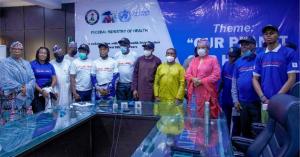WHO and stakeholders call for multisectoral approach towards climate change and other environmental threats to public health
Abuja, 8 April 2022 - As Nigeria joins the world to commemorate the 2022 World Health Day, the World Health Organization (WHO) and stakeholders call for multisectoral approach towards climate change and other environmental threats to public health in the country. This call came at the Ministerial Press conference organized by the Federal Ministry of Health (FMOH) in collaboration with WHO held on 07 April 2022.
Addressing journalists after the walk at the FMOH, the Minister of State for Health Dr Olorunmibe Mamora, reiterated the commitment of government in working with other agencies to ensure a safe and healthy environment for Nigerians to live.
Dr Mamora said the theme for the commemoration is apt as the recent events (disease outbreaks, flooding, drought) around the world emphasize the connection between human activities and the planet.
He pledged the leadership of the FMOH in (i) implementing long-term multisectoral plans; (ii) increasing private sector engagement; (iii) reducing the use of fossil fuel towards clean energy production; (iv) reduction of carbon emission; (v) implementing WHO air quality guidelines; and (vi) shift towards green economy.
"The current impact of various environmental crises such as climate change, avoidable pollution, food and waterborne disease, emerging and re-emerging infectious diseases and extreme weather events on the planet, health and every individual are increasingly difficult to ignore.
Presenting the speech of the WHO Regional Director, the Deputy WHO Representative in Nigeria, Dr. Alexander Chimbaru said climate change is manifesting in increasing temperatures, rising sea levels, changing rainfall patterns, and more frequent and severe extreme weather conditions.
He added that while many countries, (including Nigeria), have implemented Early Warning, Alerts and Response Systems (EWARS) to identify potential risks for climate-sensitive water- or vector-borne diseases, much still needs to be done.
"With Africa’s population projected to grow to 2.5 billion by 2050, we can expect burgeoning urbanization into areas exposed to natural hazards, and a concomitant increase in associated injuries, disease and deaths", he said.
Pledging WHO support to ensure Nigeria achieves Universal Health Coverage, Dr Chimbaru urged the government to urgently initiate climate change and health adaptation and mitigation actions.
“We shall support the development of Nigeria National Health Adaptation Plan (HNAP) and Conduct assessment of the vulnerability and adaptive capacity of the health systems to climate change comprising essential public health interventions, in line with the United Nations Framework Convention on Climate Change and COP26 Health Programme” he said.
Finally, he enjoined governments, civil society groups, non-government organizations, media, and communities to work together, empowering one another to ensure the continued delivery of essential health services during future extreme events, while containing the growing inside environment and lifestyle-related diseases.
"We cannot afford to lose sight of the fundamental truth that the climate crisis, the single biggest threat facing humanity today, is also very much a health crisis, '' he said.
Similarly, Dr Uzodinma Adirieje speaking on behalf of Civil Society Organizations underscored the intersection between the planet and health in human life. He urged the government and partners to prioritize interventions that reduce carbon emissions through renewable energy technologies to mitigate the harmful effect of the environment on health occasioned by human activities such as tree felling and cooking.
The highlight of the event was the health walk attended by hundreds of people from all walks of life.
World Health Day has been observed annually on 7 April, since 1950, to commemorate the anniversary of the founding of the World Health Organization (WHO) two years previously.
The theme "Our Planet, Our Health", serves as a timely reminder of the inextricable link between the planet and our health, as the burden of non-communicable and infectious diseases rises alongside the growing incidence of climate-related challenges.




